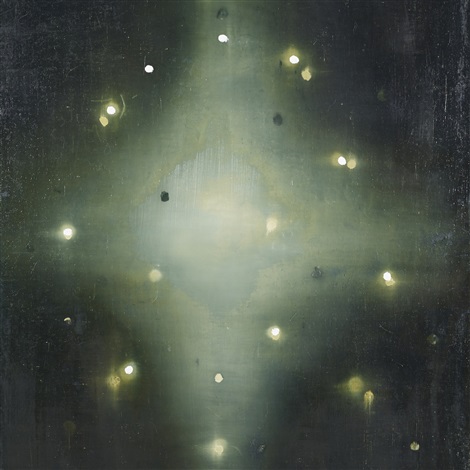What follows is not a poem in the Arabic, but part of a chapter from the Kitab al-Tajalliyat.
However, since it was translated in the form of a poem by Henry Corbin in Creative Imagination in the Sufism of Ibn 'Arabi, it has become deservedly famous.

Listen, O dearly beloved!
I am the reality of the world, the centre of the circumference,
I am the parts and the whole.
I am the will established between Heaven and Earth,
I have created perception in you only in order to be the
object of my perception.
If then you perceive me, you perceive yourself.
But you cannot perceive me through yourself,
It is through my eyes that you see me and see yourself,
Through your eyes you cannot see me.
 Dearly beloved!
Dearly beloved!
I have called you so often and you have not heard me
I have shown myself to you so often and you have not
seen me.
I have made myself fragrance so often, and you have
not smelled me.
Savorous food, and you have not tasted me.
Why can you not reach me through the object you touch
Or breathe me through sweet perfumes?
Why do you not see me?
Why do you not hear me?
Why? Why? Why?
A further development of Sufi practice by ibn Arabi was his valorization of mental ("imaginary") experiences in the mystic quest. In the traditional Sufi understanding, the things of the world are "an infinite display of ayat or signs, the intelligent interpretation and contemplation of which leads one, inevitably, back towards the absolute and unitive truth of God."
The manner in which ibn Arabi's view emerges from the conception of the names is fairly evident. However, he takes this conception in a rather novel direction. Specifically, he argues that advanced spiritual seekers develop the ability to enter into a cosmic realm, between this reality and final Unity, wherein these signs are more present. It is the task of humanity to learn to properly interpret these imaginary realities; to increase “spiritual eyesight” until each of these forms emerged from the Divine.
As such, this interstitial realm was important, because it determined one of the ways that the mystic could correctly prepare himself or herself to encounter the Divine.
However, since it was translated in the form of a poem by Henry Corbin in Creative Imagination in the Sufism of Ibn 'Arabi, it has become deservedly famous.

Listen, O dearly beloved!
I am the reality of the world, the centre of the circumference,
I am the parts and the whole.
I am the will established between Heaven and Earth,
I have created perception in you only in order to be the
object of my perception.
If then you perceive me, you perceive yourself.
But you cannot perceive me through yourself,
It is through my eyes that you see me and see yourself,
Through your eyes you cannot see me.
 Dearly beloved!
Dearly beloved!I have called you so often and you have not heard me
I have shown myself to you so often and you have not
seen me.
I have made myself fragrance so often, and you have
not smelled me.
Savorous food, and you have not tasted me.
Why can you not reach me through the object you touch
Or breathe me through sweet perfumes?
Why do you not see me?
Why do you not hear me?
Why? Why? Why?
A further development of Sufi practice by ibn Arabi was his valorization of mental ("imaginary") experiences in the mystic quest. In the traditional Sufi understanding, the things of the world are "an infinite display of ayat or signs, the intelligent interpretation and contemplation of which leads one, inevitably, back towards the absolute and unitive truth of God."
The manner in which ibn Arabi's view emerges from the conception of the names is fairly evident. However, he takes this conception in a rather novel direction. Specifically, he argues that advanced spiritual seekers develop the ability to enter into a cosmic realm, between this reality and final Unity, wherein these signs are more present. It is the task of humanity to learn to properly interpret these imaginary realities; to increase “spiritual eyesight” until each of these forms emerged from the Divine.
As such, this interstitial realm was important, because it determined one of the ways that the mystic could correctly prepare himself or herself to encounter the Divine.
No comments:
Post a Comment